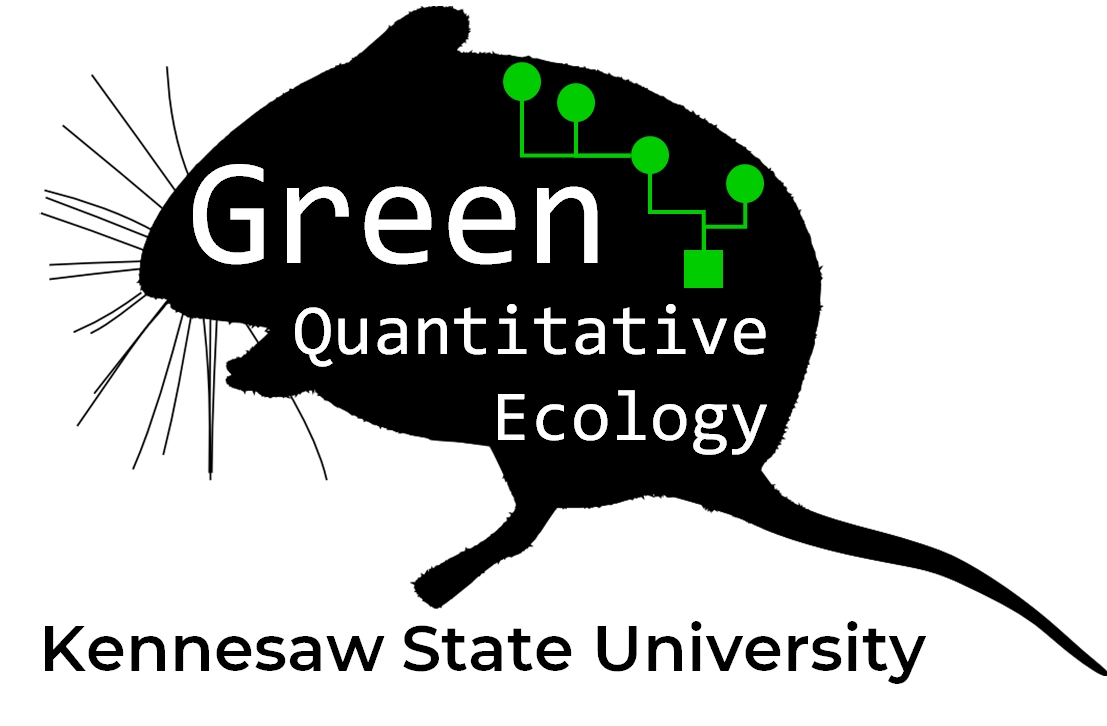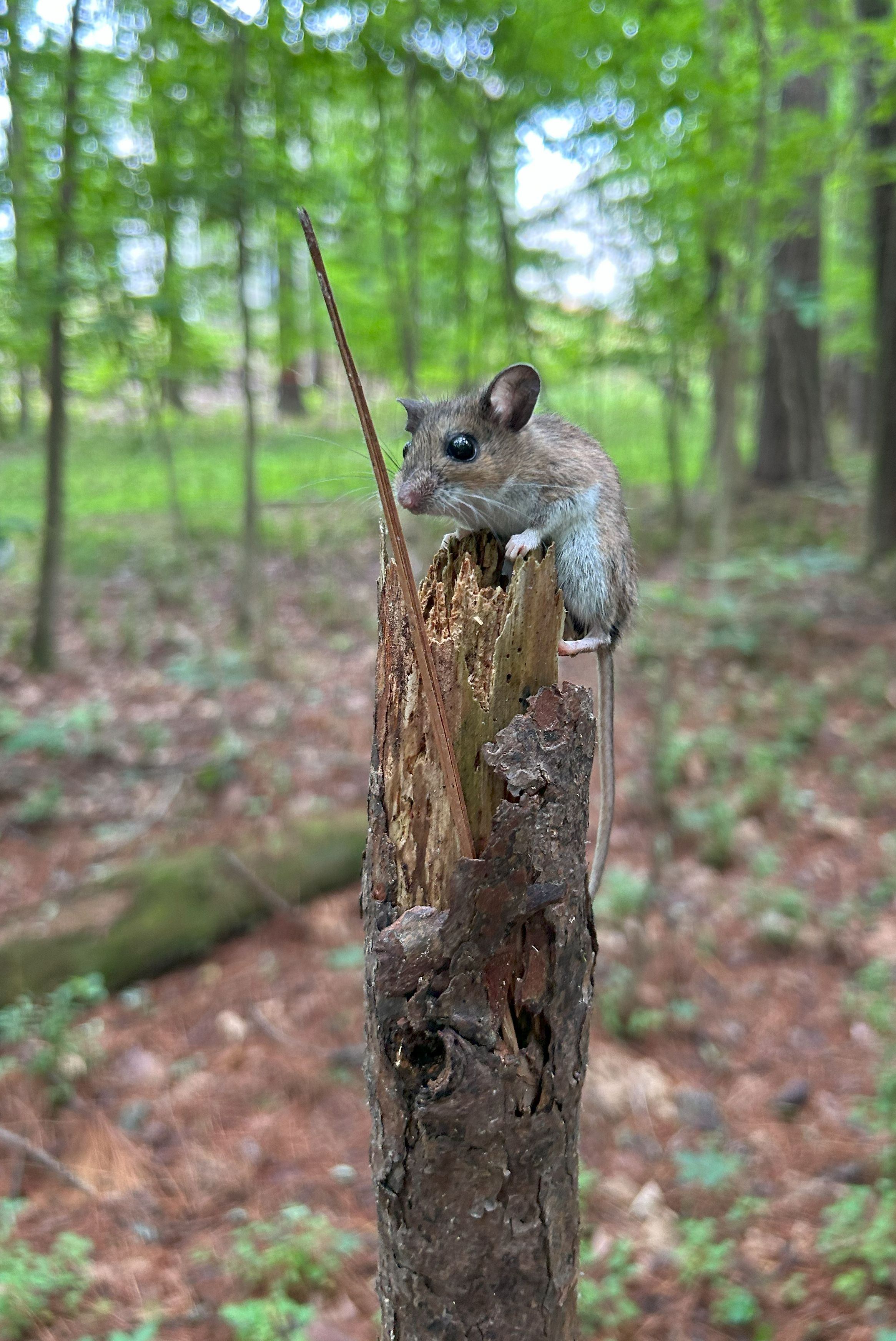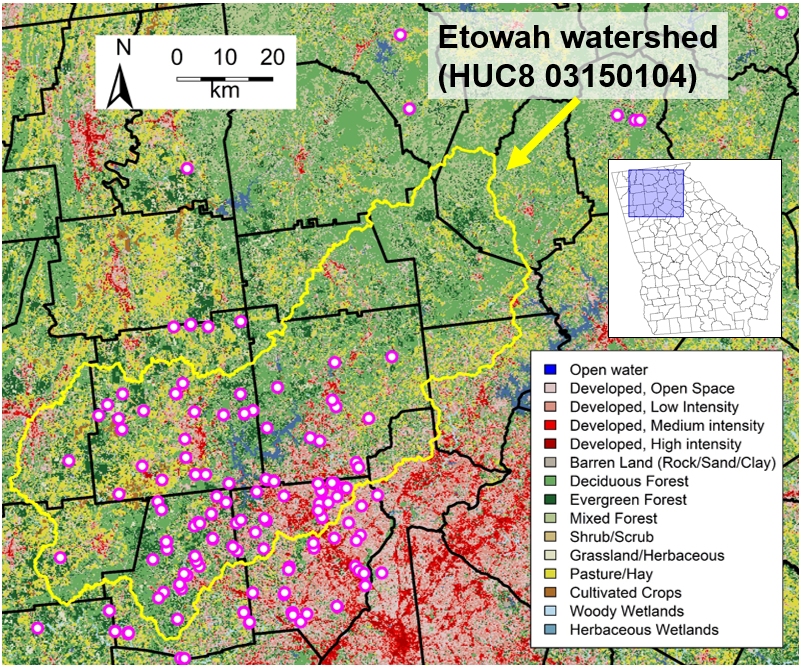Research
Overview
The Green Quantitative Ecology Lab (QuantEco) uses advanced mathematical and statistical tools to investigate relationships between living organisms and their environment. Most of our research focuses on understanding how human activities, like urbanization and climate change, affect fish and wildlife across all levels of biological organization.

While our research is often at the cutting-edge of quantitative methods, we are grounded in a rigorous tradition of field ecology and mammalogy. Our work takes us all over Georgia, from the northern Ridge and Valley to the barrier islands of the coast. To complement our computational and field work, we use a wide variety of lab methods like DNA extraction, ELISA, necropsy, craniometry, and microscopy gather the data we need from the samples we collect.
Current projects
Spatial ecology of small mammals in urbanizing environments
 Small mammals such as mice, rats, and voles are an important component of terrestrial ecosystems. As consumers of seeds and vegetation they exert enormous influence over plant communities; they are also an important prey item for numerous predators. Some species are also vectors
of important human and animal diseases. At the same time, the environments where small
mammals live are rapidly being altered by climate change and land use change as human populations
increase.
Small mammals such as mice, rats, and voles are an important component of terrestrial ecosystems. As consumers of seeds and vegetation they exert enormous influence over plant communities; they are also an important prey item for numerous predators. Some species are also vectors
of important human and animal diseases. At the same time, the environments where small
mammals live are rapidly being altered by climate change and land use change as human populations
increase.
Understanding how small mammals are affected by changes in their environment is critical to understanding changes in natural communities and emerging risks to human health. This project uses field sampling, physiological measurements, and sophisticated statistical modeling approaches to investigate how small mammals are impacted by their changing environment.
Click here and here to see two slide decks presented by Dr. Green and current MSIB student Sydney Morton showing how urbanization may be affecting small mammals across multiple levels of organization. This presentation was given at the 2025 International Urban Wildlife Conference in Atlanta in June 2025. They include findings from Sydney's thesis research as well as the theses of lab alumni Bri Casement and Leslie Lopez.
Current MSIB students Sydney Morton and Sarah Paschal are leading different aspects of this project.
- Sydney is investigating how urbanization and land use change may affect the population genetics of white-footed mice (Peromyscus leucopus), pictured above. Her project includes DNA extraction and bench work, sequence analysis, and morphological analysis of mice.
- Sarah is currently developing her project focusing on how urban and suburban land use affect small mammal health and population dynamics.
For more information, or if you are a KSU undergraduate interested in working on this project, please reach out to Sydney, Sarah, or Dr. Green.
Effects of climate change and urbanization on the Etowah watershed

As Earth's climate warms and Atlanta continues its urban sprawl, the Etowah watershed in northern Georgia is expected to undergo rapid and potentially drastic changes to its hydrology and water quality. These dual effects will likely impact the fish communities of the Etowah River and its tributaries, which include several threatened and endangered species. We are in the middle of a multi-phase project to (1) model how watershed and stream characteristics have affected historical and present fish communities; (2) project future hydrological and landscape conditions withimn the watershed; and (3) feed those projections into our fish community model to predict how fish communities might change as the watershed warms and urbanizes.
This project is being led by MSIB student Mayu Mizutani. For more information, or if you are a KSU undergraduate interested in working on this project, please reach out to Mayu or Dr. Green.
Osmoregulation in American Alligators
Info and pictures coming soon!
Effects of climate change on marine food webs
Info and pictures coming soon!
Student involvement in research
My success as a researcher and educator depends on the contributions of students of all levels—including undergraduates—in my research program. This means not only guiding students through the research process in the lab and field, but also keeping them involved through reporting and publication. Training undergraduates in field methods and data analysis has been vital to my research productivity. The quantitative and analytical skills students gain in my lab are essential in the modern job market; the quantitative and programming skills help prepare students for graduate work and for careers in academia, government, non-governmental organizations (NGOs), and industry. If you are interested in joining the QuantEco lab please contact Dr. Green by e-mail to discuss current opportunities.
Interested in joining the lab?
KSU undergraduates: if you are interested in doing research in the lab, please send me an e-mail (ngreen62@kennesaw.edu) so we can have a conversation about your interests and how they might fit in to current projects. There are many ways you can get involved so please reach out!
Potential graduate students: The next opening for a new graduate student in my lab will be for Fall 2026. An advertisement may go out via ECOLOG-L and other listservs sometime in November or December 2025. If you are interested in future opportunities, feel free to reach out by email. You can also follow the me and the lab on Bluesky (@greenquanteco.bsky.social) for updates on lab events and activities. Please note that opinions expressed on Bluesky or other social media by Dr. Green are his alone and do not reflect upon KSU or any entity of the state of Georgia.









